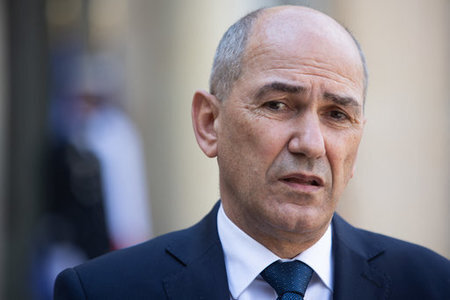[vc_row][vc_column][vc_column_text]

Prime minister of Slovenia Janez Janša
As Slovenia takes over the presidency of the council of the European Union, some are questioning the country’s commitment to one of the bloc’s key principles, that of the freedom of the press.
A new report by Media Freedom Rapid Response (MFRR), a coalition of non-governmental organisations that tracks press freedom in EU Member States, says Slovenia “is no longer a relative safe haven for free media” and that prime minister Janez Janša and the ruling Slovenia Democratic Party (SDS) are “undermining critical journalism, reaching for control of public service media and reshaping the media landscape to boost SDS propaganda channels while pressuring mainstream media”.
The report reveals that journalists in the country are facing rising threats of violence and women journalists in particular are facing misogynistic and sexist insults that have been legitimised by the government’s actions.
Janša, for example, has openly questioned the legitimacy of the Slovenian Press Agency (STA), which covers events in the country, and launched a vicious and completely unfounded attack on Bojan Veselinovic, its director, accusing him of murder.
Janša posted a tweet, a familiar tactic employed by the prime minister to put pressure on opposition voices online, which said: “Amazing for the EU in the 21st century that a collaborator in the murder of a journalist is still leading the STA and therefore cashes in 8,500 euros per month, more than the president of the republic.”
The allegations are unsubstantiated, but the STA is one of many opposition voices that has faced attacks this way.
Meanwhile, investigative journalist Blaž Zgaga, who questioned the government’s Covid-19 response in April, has received multiple death threats.
Slovenia’s 2006 media law is viewed as outdated and offers journalists little protections against smears and political interference.
It is clear there is a combination of the government attempting to change the media narrative, as well as defunding critical voices. It means journalists in the country are facing increasingly difficult circumstances.
The STA had its state funding revoked and will not receive it again unless it submits to direct financial oversight from the government’s communications office (though Slovenian media have since reported that funds are to be given). The move would essentially put the agency under the direct control of government communications.
It is indicative of a strategic ploy by the government to remove state funding from opposition voices, but reward its cheerleaders. The report says that “propaganda outlets parroting the party line are rewarded with lucrative advertising contracts from state institutions and companies”, for example.
Janša’s schemes have been likened to the strategy implemented by Hungarian autocrat prime minister Viktor Orbán, who has faced heavy criticism for his record on free speech, as has the government in Poland. Hungary and Poland are known to be two of the most concerning cases regarding free expression in Europe.
Ties between Janša and Orbán are known to be close, as Anuška Delić, journalist and founder of Oštro, a centre for investigative journalism, wrote in the winter 2020 edition of Index on Censorship magazine.
Motivation for Orbán’s interference in Slovenia is obvious, as he looks for supporting voices in a Europe when there is concern over his actions.
Hungarian funds, with ties to Orbán and his Fidesz party, are being funnelled into pro-SDS media outlets, which, in a country where media revenue is declining and funds are desperately sought, should be of great concern.
The outlook is not entirely bleak, the report said.
“Despite these pressures, the Slovenian independent media sector has proven to be resilient and has continued to display high-quality watchdog journalism during the pandemic. Importantly, support and solidarity between civil society, journalists’ associations and newsrooms has been strong, giving hope for the future of the media landscape in Slovenia.”
Yet not everyone is convinced.
Delić has welcomed the report’s findings, but questioned the notion that media freedom in Slovenia is not as threatened as elsewhere, and said that it will not take much for Slovenia to become the next Poland or Hungary.
“We have just witnessed a new case of meddling where the prime minister asked Val202, a public radio station, on Twitter whether it was true that they played a current protest song on Independence Day,” said Delić, who was consulted by the authors of the report. “On that day one of the speakers at the official celebration was Hungarian Prime Minister Viktor Orbán whose government’s malign influence in Slovenia is clearly portrayed throughout the report.”
As Slovenia takes on the Council presidency, the report’s authors have called on the country’s government to stop the defunding of journalism, amend current media legislation and publicly condemn threats against reporters.[/vc_column_text][/vc_column][/vc_row][vc_row][vc_column][three_column_post title=”You may also like to read” category_id=”8996″][/vc_column][/vc_row]





